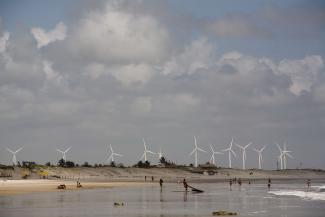Research
How green industrial policy can boost prosperity
Too many people still believe that an eco-friendly transformation must hurt an economy and especially employment. This is a fallacy.

A new report drafted by international partners shows how green industrial policy could work in developing countries (see main article). Based on empirical evidence, it argues that green industrial policy can boost prosperity:
- To a large extent, smart industrial policies depend on recognising structural shifts in markets early on and finding appropriate solutions before competitors do so. The green transformation of economic activity is underway worldwide. Wind and solar power are getting cheaper than electricity generated from coal and oil. In the energy sector, companies are now investing more in renewable energy generation than in conventional power stations, and that is so in developing countries too. Stock-market investors consider high carbon emissions a risk and factor such concerns into a company’s share price. Environmental standards are increasingly being adopted in global supply chains. Sales are booming for organic farmers. Developing countries would be well advised to appreciate these trends and draft policies accordingly.
- All major tools of economic policymaking – eco taxes, emissions trading, dismantling of environmentally harmful subsidies, gradual tightening of mandatory environmental standards – can be used in ways that reduce or even prevent adjustment shocks. When tightening environmental rules, governments can reduce burdens on business and private households in other areas. They can also offer support for the transition and time to adjust. The report is full of examples.
- Greening the economy can ultimately lead to more employment. It is methodologically impossible to establish whether the new “green” jobs will outnumber the old “dirty” ones that are phased out. But it is clear that some green sectors will generate significantly more employment. A jobs boost will come from the circular economy, which will no longer dump waste. The alternatives to dumping are to repair broken goods and to collect, sort and recycle waste. Eco-friendly energy systems will also boost employment – through widely distributed investments (solar roofs, combined heat and power systems, improved insulation et cetera). Organic farming is labour-intensive as well. China’s automotive industry is interesting in this context. The Chinese government is aggressively promoting the production of electric vehicles. One result is better air in China’s cities. Another one is that the People’s Republic is becoming a technology leader in important segments of the automotive industry. (ta)












